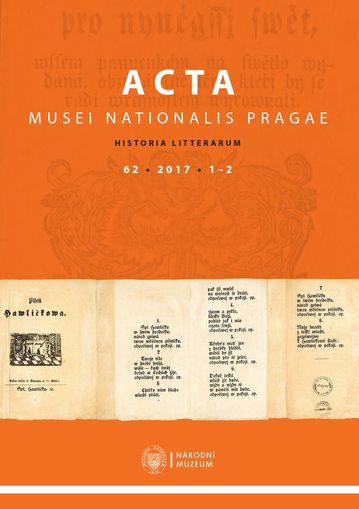
2017/62/1-2
ISSN : 2570-6861 (Print), 2570-687X (Online)
Vedoucí redaktor : Mgr. Kateřina Spurná, Ph.D.
Vedoucí redaktor : Mgr. Kateřina Spurná, Ph.D.
Laudatio PhDr. Evě Ryšavé
Výskyt kramářské písně Ó, radost má v lidové zpěvnosti
Věra Thořová
The broadside ballad Ó, radost má [Oh, My Joy] was, as far as known, first printed in Kutná Hora in 1808. Later, it began to be sung to an unprecedented number of different tunes, inspired by folk and semi-folk songs, broadside ballads, church and artificial songs. Sometimes, the tune even literally…
„Mol v drahém rouše…“ – Sbírka přísloví Jakuba Srnce z Varvažova a její latinské prameny
Marta Vaculínová
In 1582, the first printed collection of Czech proverbs by Jakub Srnec of Varvažov, Dicteria seu proverbia Bohemica, was printed. It became the basic source of the material for later collections of this kind by J. A. Comenius, J. Dobrovský and others. It was inspired by the Adagiorum chiliades by…
Střetávání zemského patriotismu, národně orientovaného vlastenectví a multinacionálního státního patriotismu v korespondenci a v odborném díle moravského historika Bedy Dudíka
Richard Mahel
For his entire life, the Moravian historiographer Beda Dudík exchanged letters with a number of important researchers and supporters of the language and nationally oriented revival in Bohemia, despite the fact that the relations between the two lands were not ideal at that time and their initial…
Paul Kersten – Buchbinderisches Engagement für das Buntpapier
Helma Schaefer
In her article, the author discusses the merits of the German craft bookbinder Paul Kersten (1865–1943) in the development of modern decorative papers as an expression of artistic individuality in the field of applied arts. From the Middle Ages, decorative paper had been used in decoration and…
Kantorská epizoda propuštěného mukla – František Křelina ve škole v Českém Dubu v lednu 1966
Renata Ferklová
The writer František Křelina (1903–1976) graduated from the teaching institute in Jičín. He first taught at village elementary schools in the Nová Paka and Turnov regions. From the mid-1930s, he was a special subject teacher at the council school in Český Dub. After the town was occupied following…
Cesta duchovní písně Pozdvihni se, duše z prachu z kramářského tisku do kancionálu
Štěpánka Běhalová
The article deals with the publication of the song for the Holy Mass with the incipit Pozdvihni se duše z prachu [Raise, Thou Soul, Thyself from the Dust] in the 19th century. The author of the text of this song is the Premonstratensian Eugen Karel Tupý, also known under the pseudonym Boleslav…
Dva morytáty o rodinné tragédii v Příboře o Vánocích roku 1844
Jiří Fiala
On the Christmas Eve of 1844, the master shoemaker Carl Ertel in Příbor murdered his wife and his three children by slitting their throats, after which he attempted suicide in the same way and died of his injuries on 31 December of the same year. This family tragedy is do cumented by records in the…
Kramářské tisky v Muzeu Komenského v Přerově
Milada Písková
The Comenius Museum in Přerov has an interesting collection of chapbooks of Moravian and Slovak provenance. In the early 1990s, it was processed in the form of a museum catalogue including photo documentation. There is no extant record of when the museum acquired this collection. The collection…
Pro mne není "láska k vlasti" prázdnou frází
Zdeněk Pousta
Having passed his secondary-school graduation exam, the young patriot Jaroslav Císař left Brno to study mathematics and astronomy in New York. He reacted to the fire of war in 1914 by his active engagement in anti-Austrian resistance, whose aim was the restoration of the independence of the Czech…
Karel Sabina a Sixt Palma Močidlanský
Helga Turková
The historical story Book of Fate, published by Karel Sabina (1813–1877) in the magazine Květy (Flowers) in 1866, deals with censorship in Bohemia at the beginning of the 17th century. In the romantic tale, Karel Sabina has combined the stories of two printers, Sixt Palma Močidlanský (approximately…
